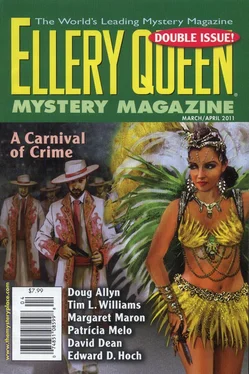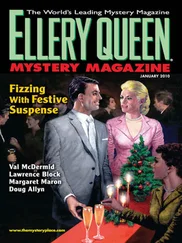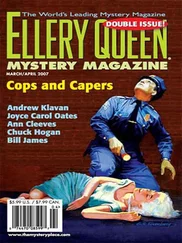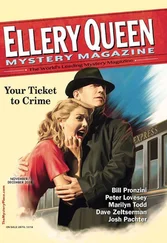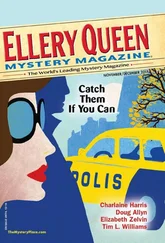Doug Allyn - Ellery Queen’s Mystery Magazine. Vol. 137, No. 3 & 4. Whole No. 835 & 836, March/April 2011
Здесь есть возможность читать онлайн «Doug Allyn - Ellery Queen’s Mystery Magazine. Vol. 137, No. 3 & 4. Whole No. 835 & 836, March/April 2011» весь текст электронной книги совершенно бесплатно (целиком полную версию без сокращений). В некоторых случаях можно слушать аудио, скачать через торрент в формате fb2 и присутствует краткое содержание. Город: New York, Год выпуска: 2011, ISBN: 2011, Издательство: Dell Magazines, Жанр: Детектив, на английском языке. Описание произведения, (предисловие) а так же отзывы посетителей доступны на портале библиотеки ЛибКат.
- Название:Ellery Queen’s Mystery Magazine. Vol. 137, No. 3 & 4. Whole No. 835 & 836, March/April 2011
- Автор:
- Издательство:Dell Magazines
- Жанр:
- Год:2011
- Город:New York
- ISBN:ISSN 0013-6328
- Рейтинг книги:5 / 5. Голосов: 1
-
Избранное:Добавить в избранное
- Отзывы:
-
Ваша оценка:
- 100
- 1
- 2
- 3
- 4
- 5
Ellery Queen’s Mystery Magazine. Vol. 137, No. 3 & 4. Whole No. 835 & 836, March/April 2011: краткое содержание, описание и аннотация
Предлагаем к чтению аннотацию, описание, краткое содержание или предисловие (зависит от того, что написал сам автор книги «Ellery Queen’s Mystery Magazine. Vol. 137, No. 3 & 4. Whole No. 835 & 836, March/April 2011»). Если вы не нашли необходимую информацию о книге — напишите в комментариях, мы постараемся отыскать её.
Ellery Queen’s Mystery Magazine. Vol. 137, No. 3 & 4. Whole No. 835 & 836, March/April 2011 — читать онлайн бесплатно полную книгу (весь текст) целиком
Ниже представлен текст книги, разбитый по страницам. Система сохранения места последней прочитанной страницы, позволяет с удобством читать онлайн бесплатно книгу «Ellery Queen’s Mystery Magazine. Vol. 137, No. 3 & 4. Whole No. 835 & 836, March/April 2011», без необходимости каждый раз заново искать на чём Вы остановились. Поставьте закладку, и сможете в любой момент перейти на страницу, на которой закончили чтение.
Интервал:
Закладка:
Olivia Stringer.
Of course, Olivia Stringer. Her name came to him suddenly. So this is how she has ended up, alone, wasted, probably a drunkard if not an out-and-out alcoholic, judging by her emaciated appearance. A massive glass of port wine and no food to be seen, and that in the middle of the day. And a day-to-day, hand-to-mouth existence too, judging by the threadbare denims and the shapeless green T-shirt. But he felt no pity for her, no compassion, not after what she had done twenty years earlier.
The case, as Hennessey recalled, had unfolded when the driver of a London express train had brought his train to a rapid but controlled stop and had reported to York control that he had “one under” and gave the approximate location. All railway traffic on the down line was halted, and the emergency services had sped to the scene.
George Hennessey, then a detective sergeant with the North Yorkshire Police, was asked to represent the CID. A suicide has to be considered suspicious until foul play can safely be ruled out. By the time Hennessey had arrived at the scene, the body had been lifted from the track, a relief driver had taken the train on, and rail traffic was flowing normally.
“I always said if I had one under, that I’d look away.” The train driver, still clearly shaken, leant against the police vehicle and pulled heavily on a cigarette, and judging by the number of butts screwed into the dry ground at his feet, it was one in a long line of cigarettes he had smoked between the time of the accident and Sergeant Hennessey’s arrival. “But you can’t, you see,” he appealed to Hennessey. “You can’t look away.” He was a small man, Hennessey recalled, and he recalled being amused to note that driving a locomotive capable of 125 miles per hour clearly didn’t involve the use of great physical strength. Up to that point, he had always thought of train drivers as being large, brawny types. Clearly, he found, that was not the case. “I rounded the bend, sixty miles an hour at this point, not fast as fast trains go, but no time to stop before impact. I brought the speed down as fast as I safely could, but there wasn’t enough track to stop. Reckon I hit him doing about forty miles per hour.”
“Fast enough.”
“Oh, aye, fast enough all right, but we had eye contact, right till the end. I mean, he was looking right into my eyes and I was looking right into his. He just stood there. Other drivers say their ‘one unders’ turn away before impact, or stand facing away from the train altogether, or attempt to jump to safety at the last minute.”
“But not this man?”
The driver took one last desperate drag of the cigarette and tossed it to the ground, whereupon he stamped it into the soil with the others. “Not this man, oh no, not this man. Not a bit of it. Have you seen him?”
“Haven’t. Why, should I?”
“Only his appearance, not the normal ‘one under,’ not shabbily dressed, if dressed at all. One of my mates had a ‘one under’ who was totally naked, escaped from a psychiatric hospital, but this guy, well dressed, pinstripe suit, bowler hat, he looked like a bank manager or an accountant, and do you know what he did?”
“Tell me.”
“Just before impact, he raised his hat to me and mouthed, ‘Thank you.’”
Hennessey sipped his tonic water and glanced across at Olivia Stringer, who sat staring into space and was now, courtesy of the planet Earth’s revolutions, bathed in a shaft of sunlight which streamed through the stained-glass window.
The “one under,” that particular “one under,” Hennessey had recalled as being very rapidly identified. What was his name? What was his name? It had an unusual ring to it, something... ordinary surname, but very unusual Christian name. Webster. That was it it... Webster. What was his Christian name? Something... Webster?
Thomson. That was it. Thomson Webster. A bank manager of the Gilleygate branch of Yorkshire and Lancashire Bank, one of the last of the family-owned banks, as it is still fond of announcing. At first Hennessey had assumed that it was a hyphenated surname.
“No,” Mrs. Webster, sitting in her very “just so” house, had said. “No, it’s a real Christian name, north of England and unusual, but it’s a real Christian name. Thomson. His grandfather was called by that name and he was christened with that name. He wanted our son to bear that name but I refused, of course.”
Hennessey sat ill at ease in the drawing room of the house, which had a superficial appearance-is-everything feel about it. Even Mrs. Webster’s distress had not seemed genuine, and with the passage of time, still didn’t seem so. The French windows opened onto a manicured lawn on which two miniature poodles played and yapped at each other, so Hennessey had further recalled.
“I’m so pleased that Cyril was able to identify poor Thomson, I’m sure I couldn’t.” Mrs. Webster had sniffed and Hennessey couldn’t help thinking that “Cyril” had been short-changed in respect of his name. Given the choice, Hennessey would have preferred to be a “Thomson” rather than a “Cyril,” especially if he had to grow up in the gritty north of England where Cyrils can have an uncomfortable time.
“Can you think of any reason why your husband should have committed suicide, Mrs. Webster?”
“None. No reason.” She had sniffed into a delicately embroidered handkerchief. “He had everything. Me, two children, this house. What more could any man want?”
George Hennessey watched as Olivia Stringer drained the glass of port and staggered with the empty glass to the bar. She fished out a plastic bag from the pocket of her jeans and from it tipped coins onto the bar top. She counted out, in silver and bronze, enough for another large port. She carried the drink unsteadily back to the seat in the corner and began to sip it. She also began talking to herself, as Hennessy’s mind went back to the next stage in that inquiry.
The next stage had been a visit to Mr. Webster’s place of work. He had found the mood among the staff sombre and subdued.
Mr. Penge received the then Sergeant Hennessey in Thomson Webster’s paneled office. “I’m a caretaker manager,” he explained, “here to look after the shop until things get sorted out.”
“Things?” Hennessey had asked. “Many things?”
“About half a million things. We would have been calling the police in now anyway,” Penge, a tall man with a serious attitude, sighed. “I confess, I never thought... a smallish family-owned bank... we enjoy a lot of staff loyalty...”
“A half-million things?” Hennessey had pressed.
“A half-million pounds.”
“Missing?”
“Well, yes, but not in the sense that we don’t know where it’s gone, but missing in the sense that it’s not where it should be. We don’t keep money like that in the vaults; it’s been drained out of a number of dormant accounts. Only found out when one account was activated and we traced the money to Thomson Webster’s personal account, from where it has been taken out in the form of cash. Confess, for a banker he left a trail any idiot could follow.”
“When did you first notice something amiss?”
“About a week ago, which was when Mr. Webster phoned to say he had flu and wouldn’t be coming in to work. We did our investigation and have concluded what we have concluded, that Thomson Webster, loyal employee of the bank, not long to go before retiring, has ruined his life by embezzling half a million pounds of customers’ money. We were about to call the police, but your timely arrival has saved a phone call. Suicide, you say?”
“Appears to be so. This morning on the railway line just south of York.”
“Poor Thomson. I knew him, knew him well. I always found him to be a man of integrity. I can’t imagine what brainstorm he must have had to make him do that... then to kill himself... Now that is the Thomson Webster I knew, a man who’d rather take his life than live with a compromised integrity, but Thomson Webster a thief... no... no way. He was a practising Christian. It must have been a period of insanity. If he had returned the money, it was something the bank would have managed... Early retirement, I would have thought, something of that sort.” Penge leaned forward and rested his forehead in the palm of his left hand. “Oh dear... then this morning we received this in the post.” He handed Hennessey a receipt. “It’s a left-luggage receipt from York station. It came with this.” He then handed Hennessey a second piece of paper which revealed itself to be a handwritten note. “It’s all there... so sorry. T. Webster.” “It’s Thomson Webster’s handwriting.”
Читать дальшеИнтервал:
Закладка:
Похожие книги на «Ellery Queen’s Mystery Magazine. Vol. 137, No. 3 & 4. Whole No. 835 & 836, March/April 2011»
Представляем Вашему вниманию похожие книги на «Ellery Queen’s Mystery Magazine. Vol. 137, No. 3 & 4. Whole No. 835 & 836, March/April 2011» списком для выбора. Мы отобрали схожую по названию и смыслу литературу в надежде предоставить читателям больше вариантов отыскать новые, интересные, ещё непрочитанные произведения.
Обсуждение, отзывы о книге «Ellery Queen’s Mystery Magazine. Vol. 137, No. 3 & 4. Whole No. 835 & 836, March/April 2011» и просто собственные мнения читателей. Оставьте ваши комментарии, напишите, что Вы думаете о произведении, его смысле или главных героях. Укажите что конкретно понравилось, а что нет, и почему Вы так считаете.
